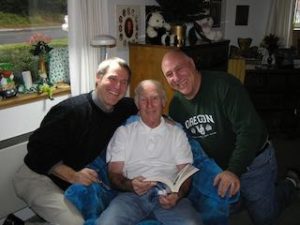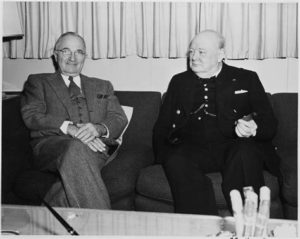 We sometimes look at the great people of the Bible as super heroes who God enlisted in a task because they were fearless and would do anything they were told unflinchingly and without any hesitation. But that was not so and the wonderful thing about the Bible is that it shows all sides of the people it portrays. Even from the most obedient men and women we see reluctance, doubt, and fear. We see also the great crutch of excuse-making that we all have used and will continue to use to avoid taking on tasks, taking on responsibility, or taking on criticism. Someone once said that excuses are like arm pits, we all have them … and they all stink. Well, the men and women of the Bible had arm pits, too.
We sometimes look at the great people of the Bible as super heroes who God enlisted in a task because they were fearless and would do anything they were told unflinchingly and without any hesitation. But that was not so and the wonderful thing about the Bible is that it shows all sides of the people it portrays. Even from the most obedient men and women we see reluctance, doubt, and fear. We see also the great crutch of excuse-making that we all have used and will continue to use to avoid taking on tasks, taking on responsibility, or taking on criticism. Someone once said that excuses are like arm pits, we all have them … and they all stink. Well, the men and women of the Bible had arm pits, too.
It doesn’t take long perusing the Bible in our minds to find some excellent examples of excuse making. Moses was called to “set his people free,” but argued that he was not the man for the job. In Exodus 3 God tells Moses, “I will send you to Pharaoh that you may bring my people, the children of Israel, out of Egypt.” But Moses said to God, “Who am I that I should go to Pharaoh and bring the children of Israel out of Egypt?” He said, “But I will be with you…” In the following verses clear into chapter 4, Moses has a series of excuses that God must address. Things like, the Pharoah is too powerful to I can’t speak well enough, are faulty reasons that Moses gives to God. Until Moses took his eyes off his own inadequacies and his difficult circumstances, he could not be used of God. When he finally gave God the reins and the reign, Moses led his people to the promised land.
inadequacies and his difficult circumstances, he could not be used of God. When he finally gave God the reins and the reign, Moses led his people to the promised land.
But, of course, Moses isn’t the lone example in excuse making. Arguably, one of the greatest Old Testament prophets was Jeremiah. Surely, he must have tackled his task without hesitation. Right? Not quite.
The word of the LORD came to me, saying, “Before I formed you in the womb I knew you, before you were born I set you apart; I appointed you as a prophet to the nations.”
“Ah, Sovereign LORD,” I said, “I do not know how to speak; I am only a child.”
But the LORD said to me, “Do not say, ‘I am only a child.’ You must go to everyone I send you to and say whatever I command you. Do not be afraid of them, for I am with you and will rescue you,” declares the LORD. Then the LORD reached out his hand and touched my mouth and said to me, “Now, I have put my words in your mouth. See, today I appoint you over nations and kingdoms to uproot and tear down, to destroy and overthrow, to build and to plant.” Jeremiah 1:4-10
 Jeremiah was not too different from us. “I can’t” or “It’s too hard” or “I don’t know how” or “someone else is better, stronger, smarter…” are just some of the excuses that he and we use to avoid uncomfortable tasks that we face. Jeremiah and Moses, fortunately, overcame their excuses and took their tasks on and served God faithfully. But some of us let our excuses stop us from doing those things we should do (or shouldn’t do). This is especially dangerous when it comes to spiritual things. Excuses abound… “The Bible is too boring and hard to understand.” “I am really too busy for God.” “I can’t talk to others about God, I don’t know enough.” “When things get settled down, I will get more serious about God.” The list goes on.
Jeremiah was not too different from us. “I can’t” or “It’s too hard” or “I don’t know how” or “someone else is better, stronger, smarter…” are just some of the excuses that he and we use to avoid uncomfortable tasks that we face. Jeremiah and Moses, fortunately, overcame their excuses and took their tasks on and served God faithfully. But some of us let our excuses stop us from doing those things we should do (or shouldn’t do). This is especially dangerous when it comes to spiritual things. Excuses abound… “The Bible is too boring and hard to understand.” “I am really too busy for God.” “I can’t talk to others about God, I don’t know enough.” “When things get settled down, I will get more serious about God.” The list goes on.
The prophet Jonah was called by God to go to Nineveh, a huge city and the avowed enemy of Israel, and call them to repentance. Jonah had all kinds of excuses for avoiding that task. He might be killed, it was a long journey, he didn’t have the “right stuff” to do it, and a classic excuse that he didn’t want to go because he knew God would forgive them and that would make him mad. “But it displeased Jonah exceedingly, and he was angry. And he prayed to the LORD and said, “O LORD, is not this what I said when I was yet in my country? That is why I made haste to flee to Tarshish; for I knew that you are a gracious God and merciful, slow to anger and abounding in steadfast love, and relenting from disaster. Therefore now, O LORD, please take my life from me, for it is better for me to die than to live.” So, Jonah didn’t  want to go because God is good and would forgive Jonah’s enemies if they repented. That’s really reaching deep in the excuse barrel.
want to go because God is good and would forgive Jonah’s enemies if they repented. That’s really reaching deep in the excuse barrel.
These are just a few examples of excuse making in the Bible, but there are countless others from Eve blaming the serpent and Adam blaming Eve all the way up through Revelation. Many of these people were called directly by God, but most of us are called by the Word of God. We know what we should do, but so often we come up with excuses (and not such original ones at that) to sit on our hands. We should only marvel that God continues to call us to service when are so slow to act. We are like reluctant middle schoolers lining the walls of the gym at their first sock-hop.
We need to remember that God has plans for us and he will only give us tasks for which we are equipped. If we don’t do what we are called to do, someone with lesser skills, but a more obedient heart might have to take over that job. We all know those people. The ones who will tackle anything because there are so many who will tackle nothing. It is better that we be one of the former than the latter. There is an old saying that a poor workman always finds fault with his tools. If we do not take on the spiritual tasks that we are called to do, we are really faulting God because He is our power to achieve.
There are usually three excuses for our inaction or our bad  actions. First, we deny that we are being neglectful or that we are doing anything wrong. Second, we fall back on the “it’s not my fault” excuse that is always quite handy. Third, we admit that we are wrong, but it is our circumstances that are at fault. So excuses are just that, they are not reasons and we can’t shape them to be reasons. We look to blame others, so we don’t have to look toward ourselves. We can’t just admit that we just don’t want to do what we are called to do or we just don’t want to stop doing what we shouldn’t do. Like the outfielder who misses the ball and holds up his glove toward the sun to tell everyone the sun was in his eyes, we hold up our excuses, so everyone knows we are not at fault.
actions. First, we deny that we are being neglectful or that we are doing anything wrong. Second, we fall back on the “it’s not my fault” excuse that is always quite handy. Third, we admit that we are wrong, but it is our circumstances that are at fault. So excuses are just that, they are not reasons and we can’t shape them to be reasons. We look to blame others, so we don’t have to look toward ourselves. We can’t just admit that we just don’t want to do what we are called to do or we just don’t want to stop doing what we shouldn’t do. Like the outfielder who misses the ball and holds up his glove toward the sun to tell everyone the sun was in his eyes, we hold up our excuses, so everyone knows we are not at fault.
We will close today with a few humorous examples of excuses that have come in on accident reports to the police.
“As I reached an intersection, a hedge sprang up, obscuring my vision.”
“I pulled away from the side of the road, glanced at my mother-in-law, and headed over the embankment.”
 “The pedestrian had no idea which direction to go, so I ran over him.”
“The pedestrian had no idea which direction to go, so I ran over him.”
“The telephone pole was approaching fast. I attempted to swerve out of its path when it struck my front end.”
“The guy was all over the road. I had to swerve a number of times before I hit him.”
Sometimes our excuses are as ridiculous as these. I hope God isn’t publishing them somewhere for people to read. Remember, excuses are the nails for building houses of failure. Let’s avoid excuses; let’s avoid failure.

 “The Lord is not slow to fulfill his promise as some count slowness, but is patient toward (us), not wishing that any should perish, but that all should reach repentance.”
“The Lord is not slow to fulfill his promise as some count slowness, but is patient toward (us), not wishing that any should perish, but that all should reach repentance.”

 They were in a special car which had the presidential seal hung up on a wall. Truman noticed Churchill studying the seal and he pointed out that he had changed it so that the eagle on the seal was turned toward the olive branch instead of the arrows. “Why not put the eagle’s head on a swivel,” suggested Churchill. “That way
They were in a special car which had the presidential seal hung up on a wall. Truman noticed Churchill studying the seal and he pointed out that he had changed it so that the eagle on the seal was turned toward the olive branch instead of the arrows. “Why not put the eagle’s head on a swivel,” suggested Churchill. “That way  you could turn it to the right or the left, depending on what the occasion warranted.”
you could turn it to the right or the left, depending on what the occasion warranted.” 
 “Finally, all of you, have unity of mind, sympathy, brotherly love, a tender heart, and a humble mind. Do not repay evil for evil or reviling for reviling, but on the contrary, bless, for to this you were called, that you may obtain a blessing.”
“Finally, all of you, have unity of mind, sympathy, brotherly love, a tender heart, and a humble mind. Do not repay evil for evil or reviling for reviling, but on the contrary, bless, for to this you were called, that you may obtain a blessing.” the shoulders, and threw him out his tent into the cold night air.
the shoulders, and threw him out his tent into the cold night air. some raggedy clothes and carrying a well-worn backpack.
some raggedy clothes and carrying a well-worn backpack. cars packed bumper to bumper because the right lane was closed ahead.
cars packed bumper to bumper because the right lane was closed ahead. We sometimes look at the great people of the Bible as super heroes who God enlisted in a task because they were fearless and would do anything they were told unflinchingly and without any hesitation.
We sometimes look at the great people of the Bible as super heroes who God enlisted in a task because they were fearless and would do anything they were told unflinchingly and without any hesitation. inadequacies and his difficult circumstances, he could not be used of God.
inadequacies and his difficult circumstances, he could not be used of God. Jeremiah was not too different from us.
Jeremiah was not too different from us. want to go because God is good and would forgive Jonah’s enemies if they repented.
want to go because God is good and would forgive Jonah’s enemies if they repented. actions. First, we deny that we are being neglectful or that we are doing anything wrong. Second, we fall back on the “it’s not my fault” excuse that is always quite handy.
actions. First, we deny that we are being neglectful or that we are doing anything wrong. Second, we fall back on the “it’s not my fault” excuse that is always quite handy. “The pedestrian had no idea which direction to go, so I ran over him.”
“The pedestrian had no idea which direction to go, so I ran over him.” “Be strong in the Lord, and in the power of his might.”
“Be strong in the Lord, and in the power of his might.”

